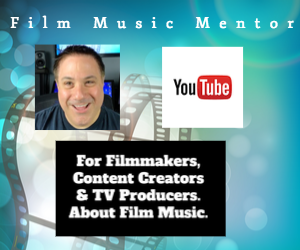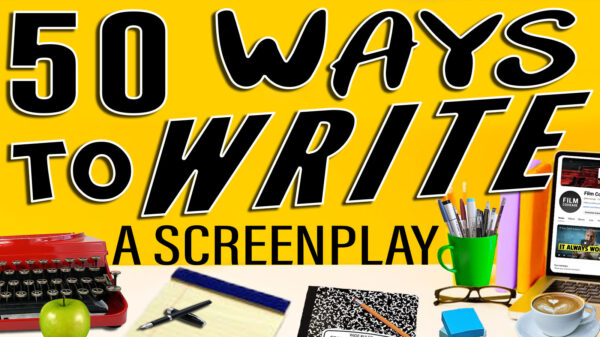
Watch the video interview on Youtube here
Film Courage: You’ve just given us 5 minutes and 8 second of advice to someone who has never written a screenplay. If you took that same advice, let’s say it’s 1995, you’re in your cab, you’re listening to Alanis Morissette, it’s in Chicago, you see the woman at the gas station which has sparked the idea. You didn’t even know it was going to be a thing. If someone had been this sort of Jiminy Cricket in your ear squeezing in “Well, you’ve got to know this structure and you need to read this book,” do you think you’d given up on the idea?
Gordy Hoffman, Founder/Judge of the Bluecat Screenplay Competition: I don’t know. That’s sort of a sad thing to think about. But I think there are a lot of people who get discouraged today because they do think they’re doing something wrong and there is that element out there on messages board, on podcasts, very popular podcasts that talk about black and white and define things in black and white and it’s dangerous. It’s like people have been trying to figure out where this industry is going, where storytelling is going all the time, since I’ve been working to write screenplays or whatever and I’ve seen all the different iterations of like Well, you’re not able to write. You shouldn’t write anything period. You shouldn’t write anything about the industry. You should do this. You shouldn’t do that. And all of this has been blown up. You shouldn’t write anything.

I mean an online bookseller, an online bookstore wins Oscars now. Don’t tell me what anything black and white is anymore, so it’s dangerous. We can talk about the rules of why people care about movies like sort of the laws of emotion and I think no one is going to really get freaked out about it. I think that’s sort of organic stuff.
But when I started off I read Michael Hauge’s book. And I don’t even remember…I don’t think he talked a lot about formulas or beat sheets (he might have talked about it). The only thing I remember from Michael’s book was encouragement, like he just empowers, he gave me hope, he definitely encouraged me. That’s what I always responded to. And he had the sense that it was rare for something good to be written but he did find it possible. It was a hopeful book. So that was the only thing I got.
It was the only screenwriting book that I ever read a lot from (I don’t know if I read the whole thing through but I would often refer to it). But then when I started I was like “Oh okay.” I knew something about page 30 and page 60 or whatever and I started trying to follow that. And I didn’t find it difficult to remember that something was supposed to happen or something like that. But I was very much on my own and I wrote whatever.
You know it’s very important for people to remember you don’t have to learn the rules to break them. You can just ignore them. If you feel like you’re being expressive and something is cool that you’re writing something that is cool and you’re showing it to other people and they think it’s cool, then that’s the only thing we care about because we would not have any Fellini, we would not have Orson Welles, we probably would not have Kurosawa. Eventually people would have to stop listening to what people are suggesting. And nowadays people being told they can’t direct, women, people of color, diversity, voices that have been discouraged or whatever. All those people I’d just be like get out of my face, I want to say what I want to say. And that’s the only way we move forward with this art form is where people just say I don’t care what I’m supposed to be doing. Or who is supposed to be directing or who is supposed to be writing. You know, the only time we can move forward are when people are like Well, let’s follow it. On page 23 this is supposed to happen. That’s when everyone wants to blow their brains out. I want something new. And that’s why things like streaming and like episodic television did grow probably in response to formulaic feature writing, it’s probably one of the reasons because people were like God can I watch something else that doesn’t feel like everything else and it’s because of the formula and people were following what they were supposed to be doing. And it’s not good!
Film Courage: Some people have sort of a punk rock ethos and that’s been in them all their lives. Others are the one in the front seat of the class that want to raise their hands first and be the teacher’s pet. So some people never want to rock the boat. Others don’t mind having people totally pissed off at them.
Gordy: It’s not about rocking the boat. It’s just realizing that emotionally audiences don’t care what page number a scene is on. All the audience is responding to is the emotional voracity. They want to be sucked in, they want to feel a part of the Universe. Have you ever thought about this, people walk into a theater to watch other people on a screen act out stuff from life and they just watch it. Why are they watching it? It’s the weirdest thing when you go into a play or into a theater, people are watching people on an imaginary stage, we’re going to watch people act out life. It doesn’t make any…it’s bizarre! But the reason why people are doing it is because it gives them meaning for their struggles. They go I’ve done that. That’s me. I’ve fought Cancer. Something happened to me. I won the State Championship. I want to be able to win the State Championship. I want to be able to come from nowhere. I want to believe. I want to fall in love. I want to survive the loss of a loved one. This can happen, I saw a story.
I mean this is why, it gives us context so we’re not walking around going Why am I doing all of this? You see the movie and you’re like Other people have been dumped! Other people have been fired! Other people have been discriminated against, there has been injustice. I’ve suffered injustice, so have they. I can live. I’m going to fight. That’s why people go to movies. That’s the only thing anybody cares about. They don’t care that the point-of-no-return happens on page 63 or some crap. You’re writing from that place. That’s not punk rock! That’s just stories. That’s storytelling. That’s conservative, liberal, it’s not supposed to be political, but I’m just saying that’s anybody. That’s any ethos, that is the ethos.
So if you’re looking to get in the business, the young lady in the front row, the person who gives the apple to the teacher, this is the business of emotion. It’s the business of human identification with authentic stories and that’s heavy lifting. That requires sharing of your life experience, it’s demanding. It’s just as much as a surgeon, it’s emotionally demanding to be a nurse. It’s emotionally demanding to be a trash man because you’re looking at people’s trash and you’re like “Oh my gosh! They threw out this photo album?” It’s like everybody has got to deal with something. This is the thing, this is that business. So you can’t get around that and when people try to get around that then the great actor becomes the good actor. And then the great screenplay becomes an okay movie. But when you go there and you sell the whole thing and you don’t shy away, then you’re Kirosawa, then you’re Eugene O’Neill, then you’re doing 12 YEARS OF SLAVE, then you’re fearless, then you’re telling this, you’re doing this thing that people go “Ahh! That’s awesome.” BLACKKKLANSMAN, an amazing, honest movie about the truth. It’s a great movie and it’s about the truth and it’s emotional, it’s disturbing. But that’s Shakespeare, that’s never changed. That’s not new, that’s not avant-garde and audiences are still responding to it. Because we’re human beings and we still respond to a good story.
Questions For The Viewers: Are you in agreement with Gordy’s POV? Anything you disagree with?

Watch the video interview on Youtube here
BLUECAT SCREENPLAY COMPETITION:
Bluecatscreenplay.com/2019-call-for-entries
MORE VIDEOS WITH GORDY HOFFMAN
https://goo.gl/Si8Qy1
CONNECT WITH GORDY HOFFMAN
Bluecatscreenplay.com
IMDB
Facebook
Twitter
Instagram
Like this video? Please subscribe to our Youtube channel. Or love this video and want more? You can show additional support via our Youtube sponsor tab (hit the JOIN button on the front page of our Youtube channel in the upper right hand corner or underneath any video if watching on Youtube) or through Patreon.
Advertisement – contains affiliate links:
Lights, Camera, Save! is a teen video contest that encourages teens to educate themselves and their peers about the value of saving and using money wisely. Each fall students enter the contest by submitting videos to local participating banks. These banks then choose a local winning video and submit it for judging at the national level. No purchase necessary. Void where prohibited.
Film Music Mentor – A Youtube channel for filmmakers, television producers, content creators and media professionals of all kinds. Film Music Mentor will help you circumvent problems even the most seasoned professionals face.
Multiple award-winning composer/music producer Andrew Markus breaks down every challenge that motion picture creators face in the process of putting music in their projects. Why it works and why it fails.
Restraint – A mentally ill woman who’s been submerging her violent impulses for years unravels after she marries a controlling older man and relocates to his suburban home by Adam Cushman




























